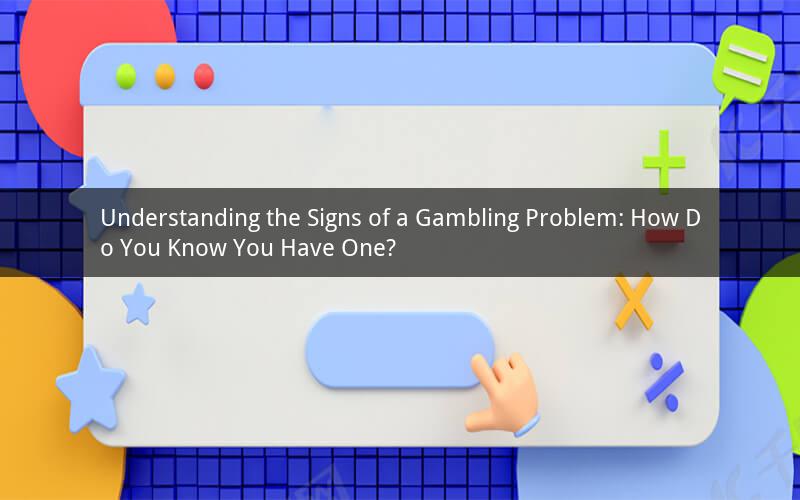
Introduction:
Gambling has become a popular form of entertainment for many people. However, it can easily lead to addiction and have severe consequences on one's life. Identifying the signs of a gambling problem is crucial in seeking help and taking control of your life. In this article, we will explore the various indicators that suggest you may have a gambling problem and how to determine if it is time to seek professional assistance.
1. Uncontrollable urge to gamble:
One of the primary signs of a gambling problem is an overwhelming urge to gamble, even when you know it is causing harm. This uncontrollable desire can lead to neglecting other responsibilities, such as work, family, and personal relationships. If you find yourself constantly thinking about gambling and feeling compelled to engage in it, it may be a sign of a gambling problem.
2. Financial difficulties:
Gambling can quickly deplete your finances, leading to financial problems and stress. If you are experiencing difficulties in managing your finances, such as paying bills, rent, or other expenses, and you suspect that gambling is the root cause, it may indicate a gambling problem. Additionally, if you are borrowing money or using credit cards to fund your gambling habits, it is a clear red flag.
3. Lying or hiding gambling activities:
If you find yourself lying or hiding your gambling activities from family, friends, or loved ones, it may be a sign of a gambling problem. This behavior is often a result of the fear of judgment or consequences. It is important to recognize that seeking help is the first step towards overcoming a gambling addiction.
4. Emotional and psychological distress:
Gambling can have a significant impact on your emotional and psychological well-being. If you are experiencing symptoms such as anxiety, depression, or mood swings, and you suspect that gambling is contributing to these issues, it may be a sign of a gambling problem. Additionally, if you are using gambling as a way to cope with stress or emotions, it is crucial to address the underlying causes.
5. Relationship problems:
Gambling can strain your relationships with family, friends, and loved ones. If you find yourself neglecting your social life or avoiding responsibilities due to your gambling habits, it may indicate a gambling problem. It is important to recognize that your relationships are suffering as a result of your gambling addiction.
6. Legal issues:
Gambling can lead to legal problems, such as fraud, theft, or other illegal activities. If you have been involved in any illegal activities due to your gambling habits, it is a clear sign that you may have a gambling problem. Seeking help is essential to prevent further legal consequences.
7. Withdrawal symptoms:
If you have attempted to stop gambling but find yourself experiencing withdrawal symptoms such as irritability, anxiety, or depression, it may indicate a gambling problem. These symptoms can be a result of the physical and psychological dependence that develops from excessive gambling.
How to seek help:
If you recognize any of the signs mentioned above, it is important to seek help immediately. Here are some steps you can take:
1. Acknowledge your problem: Admitting that you have a gambling problem is the first step towards recovery. Recognizing the issue is crucial in seeking the necessary support and treatment.
2. Seek professional help: Consult with a mental health professional or a counselor specializing in gambling addiction. They can provide you with personalized guidance and treatment options.
3. Join a support group: Joining a support group, such as Gamblers Anonymous, can provide you with a sense of community and support from others who are going through similar experiences.
4. Develop a gambling plan: Create a plan that outlines your gambling limits, including how much money you can afford to lose, how long you can gamble, and when to stop. Stick to this plan to maintain control over your gambling habits.
5. Build a support network: Surround yourself with individuals who support your recovery journey. This can include friends, family, or support groups.
Frequently Asked Questions:
Q1: Can a gambling problem be cured?
A1: Yes, a gambling problem can be treated and overcome. With the right support, therapy, and commitment to recovery, individuals can overcome their gambling addiction and lead a healthier, more fulfilling life.
Q2: How long does it take to recover from a gambling problem?
A2: The duration of recovery varies from person to person. Some individuals may experience a quick recovery, while others may require ongoing treatment and support. It is essential to be patient and persistent throughout the recovery process.
Q3: Can medication help with gambling addiction?
A3: While there are no specific medications for gambling addiction, certain medications may be prescribed to help manage symptoms of co-occurring mental health disorders, such as depression or anxiety. It is important to consult with a healthcare professional for appropriate treatment options.
Q4: Can I gamble responsibly?
A4: Responsible gambling involves setting limits and being aware of the risks involved. However, it is important to recognize that gambling addiction is a real and serious issue. It is challenging to gamble responsibly if you have a gambling problem, and seeking help is the best course of action.
Q5: What if my loved one has a gambling problem?
A5: If you suspect that a loved one has a gambling problem, it is crucial to offer support and encourage them to seek help. You can help by providing emotional support, offering to accompany them to counseling sessions, and being a source of encouragement throughout their recovery journey.